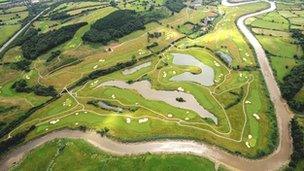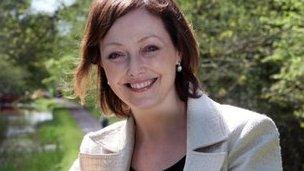Welsh tourism: USA, Germany and Ireland are targeted
- Published
Tourism chiefs in Wales say they want more luxury, spa and heritage hotels
A tourism industry bringing in another £1bn a year by targeting the US, Germany and Ireland is among ambitions set out by the Welsh government.
Tourism chiefs in Wales say they also want more luxury, spa and heritage hotels as part of a strategy to boost earnings over the next seven years.
Currently, visitors spend about £4.5bn a year in Wales, supporting nearly 89,000 full-time jobs.
Economy Minister Edwina Hart said the target was "challenging yet realistic".
Partnership for Growth, the Welsh government strategy for tourism up to 2020, calls for a focus on more heritage hotels that use historic and distinctive buildings, more luxury and branded hotels and more "well-being" facilities like spas.
The strategy also demands more all year-round attractions, activities and cultural experiences, and more "distinctive" products.
Ms Hart said how far tourism earnings will grow will depend on underlying market conditions in an increasingly competitive marketplace.
UK visitors will still be a focus, and marketing in Wales, London, south-east Midlands and Yorkshire will rise.
"This is why the growth figure has been set at a target of 10% for the tourism industry up until 2020," she said.

The Celtic Manor Resort hosted the Ryder Cup in 2010
"This is a challenging yet realistic and achievable target, taking into consideration these tough economic conditions and bearing in mind that the negative economic climate in some of our key generating markets would also make growth difficult."
Despite a blaze of publicity on the world stage for hosting the 2010 Ryder Cup at Celtic Manor Resort at Newport, the Welsh share of international visitors fell in the past three years.
Between 2009 and 2011, visitor numbers show a mixed picture. While domestic visitors increased from 8.89m to 9.69m, overseas visitors declined from 991,000 to 879,000.
Historically, the British domestic market has accounted for most visitors to Wales.
Tourism leaders gave the plans a cautious welcome.
Peter Lavin, of North Wales Tourism, told BBC Wales Today: "Obviously it's very tough economic times so if you are looking at it today you would say it's very ambitious, but in a year or two's time you may say it's not ambitious enough.
"I guess they're between a rock and a hard place.
"We have to have targets and we have to be ambitious. All our competition is also being ambitious so we have got to go for it."
International reputation
Dr Manon Williams, chief executive of Tourism and Marketing Wales, stressed the importance of Wales being in the international spotlight.
Hosting the Ryder Cup, the Ashes, and having two Premier League football clubs strengthened Wales' reputation, she said.

Dr Manon Williams said they plan to attract visitors from US, Ireland and Germany
Later this year the Womex international music event is being held in Cardiff while celebrations for the Dylan Thomas centenary in 2014 will also begin.
This presented a marvellous opportunity to launch the new tourism strategy, said Dr Williams.
Wales' landscape and heritage will always be a huge selling point, but she said they were looking to modernise the traditional idea of a holiday in Wales having to be a bucket and spade-style break dependent on the weather.
The Welsh government is also interested in gaining more big international reputation enhancing projects like Celtic Manor.
However, the profitable overseas market is a vital target for the strategy up to 2020. While overseas visitors measure just 8% by number, they spend 16% of Welsh tourism income.

The World Music Expo (Womex) is taking place in Cardiff this year
Dr Williams said: "We plan to attract visitors from the US, Ireland, and Germany." Wales' links to the first two countries are already well established, she said.
Germany could be an important market. There are new air links between Cardiff and Dusseldorf, and it is hoped German visitors will be drawn by Wales' landscape and the outdoors.
But she stressed that does not mean there will be any less attention paid to other markets, like Scandinavia and France, and a member of staff will be embedded in the Visit Britain team to aid that.
The 10% tourism earnings growth target will not be achieved easily, she admitted.
The focus will be the "five Ps", Dr Williams explained: promoting the brand of Wales; product development; people development; profitable performance, and place building.
In 2011 tourism provided nearly one in 10 of jobs across Wales. But in some areas like Pembrokeshire and Conwy, as many as one in five workers were employed in the industry.
'Dutch, German and French'
Ian Griffiths, of Celtic Camping in Pembrokeshire, said he would like to see the Welsh government help open up new markets.
"They could push for advertising to countries beyond the UK and bring students in, especially from Europe," he said.
"We get a lot of Dutch, German and French but we could do more within Europe."
An estimated 88,300 full-time jobs were supported by tourism in Wales in 2011.
Conservative heritage spokeswoman Suzy Davies said the strategy contained some good ideas, but also missed opportunities.
She added: "Tourism experts have told us in a series of forums that they want the Welsh government to examine the structure of its tourism functions. The planned governance changes do not address the minister's accountability to the industry."
- Published21 May 2013
- Published15 May 2013
- Published28 February 2013
- Published28 September 2011